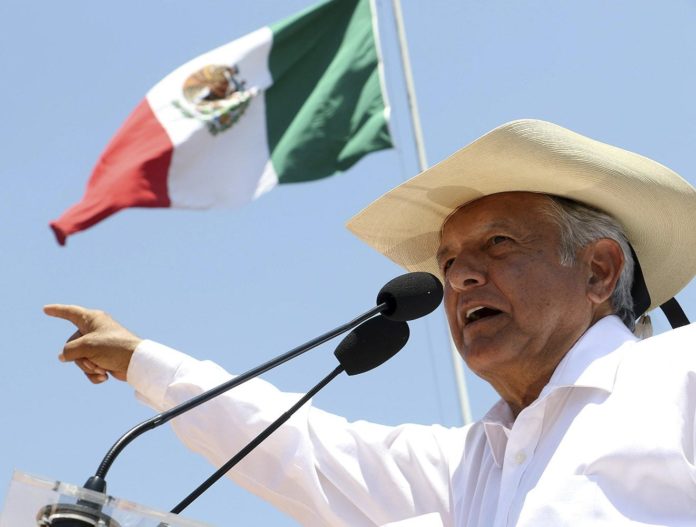
Mexico’s new populist president announced that he is dropping out of the regional US-led drug enforcement pact, and will be turning down the aid package offered through the program. Instead, he is proposing a dialogue with Washington on across-the-board drug decriminalization in both nations. And Mexican lawmakers say they will pass a cannabis legalization bill by the end of the year.
President Andres Manuel Lopez Obrador, popularly known as AMLO, made his shock announcement May 7, telling reporters in Mexico City that his government will be withdrawing from the regional drug war pact known as the Merida Initiative. “It hasn’t worked,” he said. “We don’t want cooperation in the use of force, we want cooperation for development.”
AMLO said he’d like to “reorient” the Initiative away from drug enforcement and toward social programs. “We don’t want armed helicopters, we don’t want resources for other types of military support.”
He especially plugged his ambitious proposals for economic development in Mexico’s south and Central America, which he said could help stem the tide of migration. These plans were actually officially endorsed by Washington in a “Mexico-United States Declaration of Principles on Economic Development and Cooperation in Southern Mexico and Central America,” that both governments signed after AMLO took office in December—although the US did not actually pledge any new funds for the program.
Since 2008, the US has supplied the Mexican military and police with training and equipment under the $1.4 billion Mérida Initiative, which also includes the Central American nations. It’s true that most of the big transfers of military equipment were made early in the program, and in recent years more of the funding has gone toward training police and prosecutors in an effort to reform Mexico’s notoriously corrupt justice system. But, if nothing else, AMLO’s announcement carries a powerful symbolic value.
Binational decrim instead
Along with his announcement, AMLO’s office released a 2019-2024 National Development Plan—which contained the radical notion of jointly negotiating a general drug decriminalization with the United States. “The ‘war on drugs’ has escalated the public health problem posed by currently banned substances to a public safety crisis,” the document reads, adding that the current “prohibitionist strategy is unsustainable.”
The document explicitly states that abandoning this strategy is “the only real possibility” to address the problem. “This should be pursued in a negotiated manner, both in the bilateral relationship with the United States and in the multilateral sphere, within the UN.”
In response to this startling development, Steve Hawkins, director of the Marijuana Policy Project, told Newsweek that the AMLO’s proposal “reflects a shift in thinking on drug policy that is taking place around the world, including here in the US.”
Even if the notion of Donald Trump going along with the idea challenges the imagination, AMLO’s proposal certainly shifts the spectrum of acceptable debate significantly in the right direction.
Cannabis legalization pledged by year’s end
Mexican legislators are already taking a first step toward this agenda, announcing last month their intention to pass a cannabis legalization law by October. Details of the bill are to be prepared over the summer recess, which began May 1 and ends Aug. 31.
Julio Ramón Menchaca Salazar, head of the Senate Justice Committee, said that his committee will “take advantage of the recess period” to finalize the bill, according to a noticeposted on the Senate website and reported by Marijuana Moment blog. A preliminary versionof the bill anticipated permitting cultivation of up to 20 plants for personal use on private property, and under a regulatory regime.
The Senate Health Committee also held hearings this year on cannabis legalization, which was mandated by a ruling of Mexico’s Supreme Court in October. That decision, which found cannabis prohibition unconstitutional on individual liberty grounds, actually imposed a 90-day deadline for the country’s Congress to bring the law into conformity with the ruling.
That deadline has of course expired, and the new one set by the Senate actually foresees legalization taking effect a full year after the high court order.
But, even belatedly, it will certainly increase the pressure on Washington to finally legalize—or be left behind by its neighbors to the north and south alike.
Drug war violence continues —for now
While these developments are definitely encouraging, it’s important not to have too utopian a view. AMLO ran last year on a promise to de-escalate the relentless narco-violence, with a slogan of “Abrazos, no balazos”—Hugs, not shoot-outs. Upon taking office, he declared the drug war over. Yet, as the Washington Post notes, AMLO’s new approach hasn’t brought much change—at least not yet. The number of homicides has continued to rise, hitting a record 8,493 in the first quarter of 2019.
Despite AMLO’s declaration of drug peace, military troops are still being mobilized against traffickers—and campesino cannabis growers. AMLO’s big development plans for the impoverished south are meanwhile adamantly opposed by the Zapatista rebels and other peasant and indigenous organizations of the region, who fear the loss of their lands to tourism and mega-projects.
An estimated 200,000 have been killed in Mexico since President Felipe Calderón first mobilized the army to fight the cartels 13 years ago.
Cross-post to Freedom Leaf and Global Ganja Report
Photo: El Txoro




